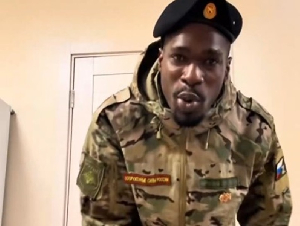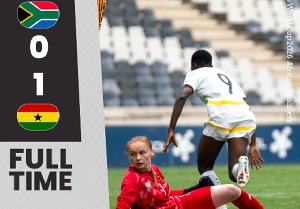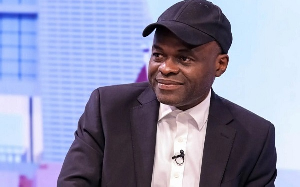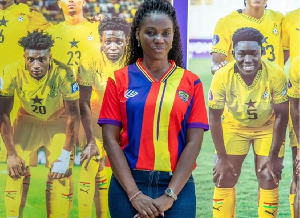One of the very few Ghanaian musicians who can be described as successful in his chosen career and has managed to sell Ghana abroad is Kojo Antwi, otherwise popularly referred to as Mr. Musicman.
Kojo Antwi recently granted The Ghanaian Observer an exclusive interview, during which he poured out his heart on current trends in the Ghanaian music industry and African music in general. The interview was conducted by Edmund Smith-Asante in Accra.
You know, [come to] think of it, African-Americans at a certain time were singing Negro Spirituals.
When they were slaves, they used the music to talk about their situation to draw some strength from it. It grew from there to Jazz, Blues, they got Soul out of it and out of the Soul came Funk and R & B. And it keeps going but it seems like we just gotten hold of the highlife thing and we think that every Ghanaian should just play ?Amponsah.?
Ghanaian Observer: I?ve come to like you for one reason; your music, I?m sure you know by now is of a different class. People call you Mr. Musicman- how did you get that name?
Kojo.Antwi: It happens to be one of the titles of my album. I think the fifth album or the seventh and somehow it has become more like a trade mark. You know, Kojo Antwi, Musicman, Kojo Antwi but it only happenes to be one of the titles of my songs.
G.O: So how many albums do you have to your credit now?
K.A: Twelve.
G.O: Twelve, wow!
K.A: Plus collaborations and also there was a group thing before going solo; we recorded two albums before [my] going solo.
G.O: Yeah you said you want to speak about the music in Ghana?
K.A: Industry as a whole.
G.O: What do you think about the music in Ghana now? The standard.
K.A: The standard. Erm, it depends [on] what you are looking at in the first place. You see, some producers that we have are only looking for the Ghanaian market, so they would be satisfied with the sales within Kumasi and Techiman but I?m looking at, you know, above the sky.
Erm, I believe... the standard of Ghanaian music during the days of Uhuru, Ramblers, you know, they produced musicians like Jerry Hanson, Ebo Taylor... I?m talking about some of our pioneers. This trumpeter who is in Australia now, I?ve forgotten his name... but we produced...I mean Ghanaians have produced a lot of brilliant musicians. Miriam Makeba had Ghanaians in her band, Stanley Todd and Frankie Todd, two brothers. Hugh Masekela came from South Africa to take a whole group from Ghana to the States, he named them Ogya you know.
And Osibisa- for me, you know Osibisa are like the pioneers of the so called world music... Fela had Ghanaians in his band, Sony Ade and Ebenezer Obeng and all of them. Ghana used to be like a place that they were all coming to...it used to be like the Mecca that they were all coming to tap into what we were doing, you know, but erm, somehow I think we got too comfortable you know, we got too comfortable and some of our music became a bit negative- talking about owuo [death] and ohia [poverty]... you know, very very negative, so I believe, I mean my view is that was when music and the standard started going down.
Erm...Presently we have a lot of young guys who are very knowledgeable and the... hiplife is for me, an extension of, I mean it?s a growth because we?ve been doing the highlife for much too long. You know, [come to] think of it, African-Americans at a certain time were singing Negro Spirituals.
When they were slaves, they used the music to talk about their situation to draw some strength from it. It grew from there to Jazz, Blues, they got Soul out of it and out of the Soul came Funk and R & B.
And it keeps going but it seems like we just gotten hold of the highlife thing and we think that every Ghanaian should just play ?Amponsah.? For me I think ?Amponsah? was someone?s creativity.
Someone created that rythm with the guitar [mimics sound of rythm on guitar]. That was someone?s creation. What am I adding to [it], you know and this is where I mean I try much as I can not to like erm, get myself labelled you know, because when I am travelling out of Ghana and I am given the forms to fill, I write musician, I don?t write highlife musician; understand what I am saying?
You know, I write music. I believe what I was blessed with is music, not for the fact that I was born in Ghana doesn?t mean I?ve to just... you know to give you an example Jonathan Butler is a South African but for his music he plays a little of R & B, sometimes Jazz, now he is into gospel. Akon, the Senegalese- he doesn?t sound anything like using beats, you know he is doing more hip-hop, you understand what I?m saying?
For me I think we have to allow the youth to explore. We don?t have to just keep saying... you know we get people from Nigeria... 2 Face and all of them; they come with music that Ghanaians can do better than that but because when you record and there is no... I mean now, some of the...Wutah and all the rest are coming out English songs Ghanaians are embracing them but I know of some ?wicked? Ghanaian musicians who are very good and because they don?t sing highlife, because there is no ?Amponsah? erm links in their music, some of the tracks do not even get air play, you know. I think we have to open up.
G.O: What do you think is the cause of that?
K.A: I think erm... the emergence of the numerous radio stations. At a certain point we were all crying for more radio [stations]- because we thought GBC alone was not enough. I believe the radio stations are spearheading the direction of our music and so young ones are tempted because they want to get their music played, they just tow the line [thinking] oh if I don?t do this my music will not be played.
G.O: Where do they get that idea from?
K.A: Because the radio presenters are only mixing one song into another or they master some kind of beat before... if they can?t mix into it it is not music you know, and I think that?s a bit dangerous for the musician. Because ... I believe having all these numerous radio stations; over 150 nationwide means we need to have varieties you know, not that you tune in from one radio station to the other and you feel you are listening to the same radio station. And I think once we start getting varieties, people will like it. Because there is a lot of good music out there, not just from Ghanaians but a lot of good musicians out there.
G.O: Many also say that Ghanaian music has come of age and it?s better than it used to be, but [in spite of] those people making noise that they are making it in music, in respect to the albums they release, my impression is that Ghanaian music is not out there in other countries or the Diaspora as in Ghana. What do you think accounts for ithis?
K.A: Well, Ghanaians are supporting their musicians, and that?s a positive thing. Before, I believe they were playing more foreign music than Ghanaian music and because we have Ghanaians all over the world, when they leave our shores and they miss home, the only thing that brings them closer to home is the movies- some of the Nigeria movies and the music; you know.
And you know black people in general; when you find a job and you get your pay, and you have and can afford, the first thing you want to get is a television and a good ghetto blaster or a sound system. And when they are out there they don?t want to listen to Michael Jackson or Beyonce because they see it [them] on MTV all the time anyway. And so erm...our music is getting a lot of support from the Ghanaians.
When I was playing in a band that we were doing mostly cpyright music, we wouldn?t...we never wanted to be identified with some local...there were songs like ?Sweet Mother,? we wouldn?t touch it. We tought it was something we wouldn?t learn anything from. We would rather play songs of Earth, Wind and Fire, you know, The Commodores, because we felt at least we would get a cord that we could use. We felt many of the songs were too local for us. And I believe a lot of Ghanaians, guys around my age were like, if you were heard listening to the song of let me say- I mean I am not trying to down play anyone, someone like say Konadu, you would be termed as ?cocoa ase? you know, but they were good music.
But now, you have Ghanaians really going for their cassettees and that is a positive thing. Because when you erm...mention someone like erm... what?s the name of this guy? This popular British musician... I have forgotten his name... American music is out here, because whether you like it or not, you will see it on CNN, see it on MTV. They won?t give other music more exposure than the American music. And the same applies to all the other networks you know.
Erm... we are not getting the same platforms as erm... Youssou N?Dour, the Angelic Kidjos... But if you take Africa as a whole, Africa is such a large continent but if you talk of the stars we have, I mean you can think of Lucky Dube, Alpha Blondy, Youssou N?Dour, Angelic Kidjo, Mory Kante, Salifu Keita, I mean you can?t get even 20, and that?s a shame, but that shows the standard of...The West, they have always considered our music as something that erm...
When they discover Youssou N?Dour, they feel we should all sound like him. When they discover Miriam Makeba everybody in Africa should sound like Miriam Makeba, and that?s the problem we have. I think it is positive that Ghanaians are supporting their music industry.
G.O: But don?t you think that it is also because Ghanaians are more into mediocre things; they think oh this is okay, if people buy copies of my music in Ghana that is okay? The ordinary Ghanaian or average Ghanaian would say ?Menya me bribi di nkoa dee [so long as I can get something from the sale of my music] it is okay. Don?t you think that is what is affecting our music industry?
K.A: I agree to that, but erm...you see, the scenarios are such that you have young guys who are trained to become stars, you know. For them at a certain point in their lives even to have a microphone was a dream. Now they find themselves in a studio, the studio engineer programmes something for them, they yab on top or rap on top of it, and their producer is able to give it to DJs... erm...little something goes into it, and music gets some kind of air play.
The presenters start showering a lot of praises and that?s the end of the whole thing, because erm...they make you start believing that you have made it, you know, and then it gets to the point that you realise wow you are popular but you can?t support that lifestyle, because the market we have is not big enough to...I mean out there you can come out with one album; a song, not even an album, you can write a song and instantly it becomes a hit.
The royalties you get from it people will cover, they will use it for different things, and that will be enough to even sustain you for your lifetime. But because we don?t have an industry, and we don?t have a lot of producers with vision, they only want to invest and see returns in three weeks or three months time.
G.O: So when is that going to change?
K.A: Erm that?s a good question but...it would change I believe, but it will only change when erm...when we?ve learnt to sacrifice. When we learn to stick to what we believe in. You know the fact is, it?s not about sales. You know, it?s really not about sales.
It is more about erm...believing in a song; believing this is a good song. I have had a lot of times I write songs and I...a song like ?Me dofo pa?. It was kind of very dull, laid back and slow and when I came up with that particular album, ?Akuaba? everybody was like why don?t you do it fast, and I said I like that song, I am going to work on that song.
I came out with the video and it started playing slowly, I believed in it and I knew it was gonna work and when it works that way it stays longer with the people and I mean just anything, you understand what I am saying? So it?s not about... sometimes it?s not all the time that you win. Some of the songs you believe in will work, some won?t work but I believe it?s about sacrificing and believing in yourself and also knowing that you are not doing it for money. Whether you sell two or sell 20,000 albums you are still an artiste and can be producing it. When you look at the artiste in this way, he would probably last longer.
G.O: What are you doing to help the up and coming ones who you think have the potential?
K.A: Erm...I believe everything I do is some kind of footprint. When you take my album, when you check the way I am mounted- I am the only artiste with a platform within a year to come out there and do a show for them you know. If I were someone else I would be playing every month because I see (charlie) they want to see me, they love me you know. But the whole thing is about over exposure. I get a lot of the young ones erm... I am planning, I mean I will come back to that.
I meet Kwadee, Buk Bak, Kwata, I mean all of them. Some of them work in my studio sometimes, and when we come together I talk to them like brothers, we brainstorm, share ideas but what I am planning now is to do a lot of workshops. But I am not doing the workshops to like impose my ideas on them. It would be more like a brainstorm, we will share our experiences and try to learn from it, you know.
But I believe until we get the big picture we would all be making erm... I am not taking myself out of it, we are all in the same boat, you know. It is either we all rise...
G.O: Over the years Kojo Antwi has become a household name, (K.A. interjects- That?s a blessing) Is it because you are not behaving like anybody else? And one thing I have personally noticed is that as you were saying, you were talking about over exposure. I think that is something nobody has thought of. People think that they have made it, and the more you have engagements the more you make it.
K.A: That?s wrong. That is totally wrong. We don?t have an industry that allows the young ones to grow. I came out with the first album, I had a song called ?Emere bi beba.? It was my first album. Geman, a good friend of mine was doing a show then. He had come out with another song erm...?Hilife in G-Major?, it was big at the Star hotel. He came to see me and said, Kojo and I said I am not ready and I said you can go ahead you can use the song and he appeared on TV. People thought the song was his. ?Dade Anoma? got a lot of airplay, Jewel Ackah sung Kofi Ackah, used it on TV and everybody saw him singing the song and thought the song was his.
You know, I came out with ?Bome Nkomo De.? It was after ?Nkomo De? got a little bit of a... that was when I came out to do a show. But by then I had a repertoire and at least I could entertain the crowd for about one hour and half. You know, one and half hours, then you can at least command the crowd. But if an artiste comes out with an album, maybe just two tracks are popular on the album. And then you mount the platform...this is why you have to pack them 30 and over, and this is bad, you know.
I speak against this all the time but I will...everybody who comes to me wants me to help the person come out with a production- I always ask, what else do you do apart from music? You don?t do anything else apart from music, I don?t want to touch your, I mean touch whatever you do because you can only depend on it until about four or five albums. The only time people time people begin to take you serious is when they see some consistency. That you are there, you are releasing, you are releasing...When one album becomes a hit they will go back for the old ones and guys don?t want to go through, they want the short cut to fame, you know.
So most people go out there, they get all the praises and then by the time they know they go back to work harder, they start believing what is happening and by the time they know, that?s the end of it. We don?t have shows that is about the artiste. We will have a show here that is only about the artiste- the only thing is that it is about the foreign artiste, you know. We bring worn out foreign artistes here, you know.
If you see any of my colleagues playing...you see that beauty pageant? That they are playing like a second to, you know. Or it?s a show about nescafe... You know, shows are not about... like the way Daddy Lumba can come and [do a show] at the Conference centre... We need more giants [like that].
We need to create more giants in gospel music, with the circular music, we need to create giants because we can?t allow others to come and ermm...collect all the doughs...No local artiste would be given a quarter of that. We the artistes, we need to sacrifice and always look at the end of the road. Not just get blinded by the glamour and the stage lights.
More to follow soon.
Music of Sunday, 10 September 2006
Source: ghanamusic.com












